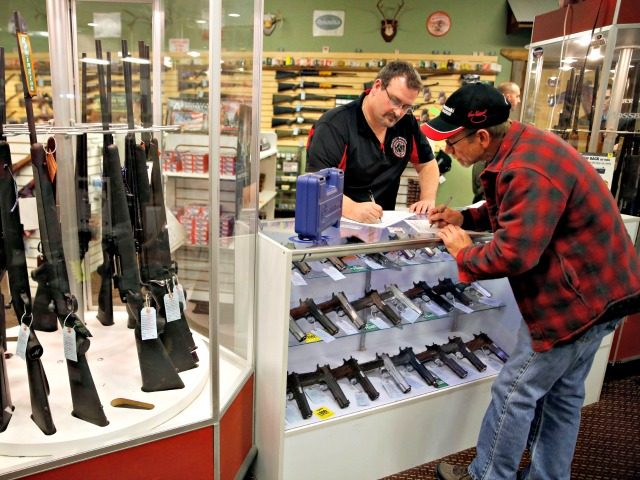Senate Republicans, led by Sen. Susan Collins (R.-Maine), worked Monday night with Democrats, such as Sen. Chris Murphy (D.- Conn.), to fashion a compromise to give Democrats the No-Fly-No-Buy legislation they have been demanding in their political response to the June 12 spree-shooting in an Orlando, Florida gay nightclub.
“All of us are would like to see a compromise we can support,” said Sen. John S. McCain III (R.-Ariz.), as he was walking off the Senate floor. Although the voting was done for the night, more than sixty of the 100 senators remained on the floor working in small groups, trying to reach a consensus.
McCain said he would not make a prediction.
“Honestly, I don’t know because I have seen this movie before,” he said. “A lot of times there is a breakthrough all of a sudden and a lot of times, there isn’t.”
The Arizona senator said some senators are working on the No-Fly List angle and others on ways to expand background checks.
“There are different people negotiating different people and there are all sorts of things going on,” he said.
The senator said he appreciates the fresh focus on the how the No-Fly List is maintained, but he is not ready to vote in favor of the proposal Collins is working on with Murphy.
One of the Democrats involved in the discussions on the floor, Sen. Christopher A. Coons (D.-Del.), told Breitbart News he was optimistic.
“There is a whole lot of discussion going on right now to see whether there is enough support and interest on both sides to move to a next step,” Coons said.
Coons said that during the debate about the No-Fly List he became aware of problems with the lists the federal government uses. “I need to better understand these lists. Who maintains them, how reliable they are, and whether they are sufficiently predictive of an individual’s inclination to engage in terrorism to be a well-grounded reason to prevent them from having any ability to purchase weapons.”
The tension is between resolving concerns about the Terror Watch Lists and concerns about protecting gun rights, he said.
“My orientation is that we need to take stronger and more decisive action on strengthening background checks,” he said.
“How do you balance Second Amendment rights with keeping the America people safe and what is the sweet spot that could pull enough support from both parties that would make this worth a sustained effort?”
The Democrats eschewed more complex or even more controversial legislation to advance their campaign to restrict gun rights in favor of a simple proposal: If your name is on the No-Fly List as a suspected terrorist, then you cannot buy a firearm: No-Fly-No-Buy. Besides being a simple proposal, it rhymes.
There were four gun rights amendments brought to the floor Monday that would be attached to the S.R. 2578, the appropriations bill for the Commerce Department, Justice Department, and multiple projects and programs under the heading of “Science.” Of the four, the ones proposed by Sen. Charles Grassley (R.-Iowa) and Sen. Richard Blumenthal (D.-Conn.) were never considered to have a serious chance of passing.
The main events were amendments by Sen. Dianne Feinstein (D.-Calif.) and Sen. John Cornyn (R.-Texas).
Feinstein’s proposal was the No-Fly-N0-Buy law that would connect the federal government’s various Terror Watch Lists, used to block passengers from boarding commercial flights.
Cornyn’s proposal, backed by the National Rifle Association, would flag and pause purchases by someone on the Terror Watch Lists and give government three days to prove the sale should not be approved.
All four proposals were blocked from coming to a vote, because each one failed to reach the 60-vote threshold needed to end debate and force a vote. Under the rules of the Senate, measures are approved by a simple majority, but often the vote to end debate, called cloture, is the real fight.

COMMENTS
Please let us know if you're having issues with commenting.